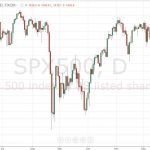The chief uncertainty has shifted from monetary policy and macroeconomics to the increase of volatility in the stock markets and the prospects of a trade war.
Some of the major benchmarks, including the S&P 500, the MSCI Asia Pacific Index, the MSCI Emerging Markets Index, and Shanghai Composite held above the February lows in the retreat during the second half of March. Other bourses did not. These include the DAX, the FTSE 100 and 250, the CAC40, and the Nikkei.
However, even for those markets that made new lows, they were often marginal and ahead of the quarter-end, stabilized. Technical indicators suggest that a low may have been recorded. While some investors are positioned for Q2, it appears that cash levels have been raised and many investors will wait to see what happens, perhaps until after the US jobs data at the end of the week.
FactSet reports that Q1 earnings expectations for the S&P 500 have risen by 5.4% on a bottom-up basis over the course of the quarter. This is highly unusual. Forecasts generally fall. Over the past ten years, they have been reduced on average by 5.5%. It is the largest increase since the FactSet began tracking the data in Q2 02. Earnings expectations for the entire year have also been lifted. The 7% increase is the most since at least 1996.
One can be a realist and reject the militarization of the competition between countries. For years, we were told there was a currency war. Now it is a trade war. Tensions between countries are best thought of as an escalation ladder. War, as the father of military realism, Clausewitz, taught, is the continuation of politics by other means. There is nearly a constant low level of trade tensions even between the best of friends and allies (e.g., US-Canada, Germany-France).
Given the amount of trade that the US has impacted with its series of measures (solar panels, washing machines, steel, aluminum, and a range of Chinese produced goods) and the extent of the retaliatory measures, these are still the low rungs of the escalation ladder. At first there were going to be no exemptions, and now there are several. The WTO will be the most important challenge to US actions, and this may help strengthen the multilateral process, which so many seem to be prematurely eulogizing.
The US is pressing to get more of the distributional benefits from trade. Discussions with foreign officials confirm our suspicions that many are prepared to make small concessions to avoid moving higher on the escalation ladder. In Europe, Germany appears to be more willing to make some concession; France less so. The temporary exemptions from the tariffs currently have a May 1 deadline. That means there will be much jockeying for position, posturing and a little negotiating.
Oscar Wilde said that there were only two tragedies in life, not getting what one wants and getting it. It seems applicable to trade. The fiscal stimulus in the form of tax cuts and increased spending, while the economy is growing above trend, is likely to boost US imports, fueling a widening of the trade deficit.













Leave A Comment